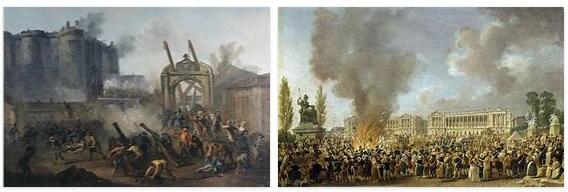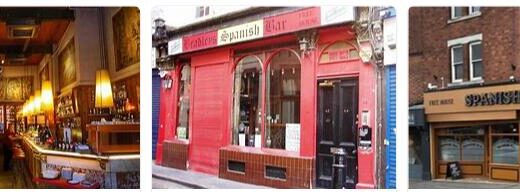France History: Fifth Republic – From de Gaulle to Giscard d’Estaing
With the constitution of the Fifth Republic of October 4, 1958 (approved by the population on September 28, 1958) de Gaulle, consciously turning away from the constitutions of the Third and Fourth Republic, strengthened the power of government, especially that of the President, at the expense of the legislature Organs. In December 1958, a body of electorates elected de Gaulle as President by a large majority (78.5%). Due to the introduction of the election of the president by the people (approved by referendum on October 28, 1962) de Gaulle was able to expand the domestic political power of his office. His from Prime Ministers M. Debré (1959–62), G. Pompidou (1962–68) and M. Couve de Murville (1968–69) ruled governments were able to rely on a strong Gaullist faction (Gaullism) in the National Assembly.
At the beginning of his tenure, de Gaulle v. a. presented two problems left by the Fourth Republic: inflation and the Algerian war. With the introduction of the “Nouveau Franc” (1959), the government sought to achieve monetary stability. Against the resistance of the French Algeria, who carried out terrorist attacks through the OAS (Organization de l’Armée Secrète), and from parts of the army (attempted coup in 1961), the president enforced the Treaty of Évian-les-Bains (March 18, 1962, approved) Referendum on April 8, 1962) gave Algeria independence. As early as 1960, the states linked to France in the French Community had received full sovereignty.
De Gaulle’s most important foreign policy goal was to preserve France’s independence and its international reputation. Since he rejected automatically acting alliance obligations, he released the French troops from the military integration of NATO in 1966. With the establishment of a national French nuclear force, he wanted to ensure the military protection of France. He tried to reduce European integration to its economic goals in the sense of a “Europe of the Fatherlands”. An enlargement of the European Communities, v. a. the accession of Great Britain, he refused. With the signing of the Franco-German Treaty (January 22, 1963) by de Gaulle and Federal Chancellor K. Adenauer the policy of Franco-German reconciliation reached a climax. In international politics, the French government turned against the power-political preponderance of the USA and the USSR, especially on questions of disarmament. In the Vietnam War and the Middle East conflict, she tried to secure an independent position for France.
In the presidential elections of 1965, according to Abbreviationfinder, de Gaulle was able to prevail in the second ballot against F. Mitterrand, the candidate of the Left Federation. The postponement of social improvements in favor of a forced development of a national nuclear force triggered social dissatisfaction.
Since May 3, 1968 there was serious student unrest in Paris, which, in connection with a strike movement initiated by the trade unions on May 13, called the existence of the Fifth Republic into question. De Gaulle promised to counteract the harsh criticism of social and political conditions, which was accentuated differently by trade unions, left-wing parties and students on May 25, a reform program under the concept of “Participation” held out the prospect of workers’ participation in economic decisions. After the government and the trade unions reached an agreement on May 27th to meet the social demands of the strikers, the strike subsided in June 1968. In October 1968 the government passed a law on participation in universities. When the population voted in a referendum in April 1969, inter alia. rejected a reform of the Senate and a regional reform, de Gaulle resigned as president.
In the presidential elections in June 1969, the Gaullist candidate Pompidou prevailed against A. Poher (CD) in the second ballot. Based on the Prime Ministers J. Chaban-Delmas (1969–72) and P. Messmer (1972–74), Pompidou continued the basic lines of the foreign policy of his predecessor, but agreed in his European policy of enlarging the EC, v. a. the inclusion of Great Britain, too. In the international disarmament debate, the government B. turned against all efforts for by way of collective arms limitations (. The Kernwaffensperrvertrag) to consolidate hegemonic structures, but advocated participation in the Conference on Security and Cooperation in Europe (CSCE). Inside, too, Pompidou essentially continued de Gaulle’spolicy. Through an administrative reform he created 22 regions, which, however, received little independence. Since 1972, the opposition gathered in the party alliance Union de la Gauche (Left Union) under the leadership of Mitterrand (with the Parti Socialiste, the Parti Communiste Français and the Mouvement des Radicaux de Gauche).
After Pompidou’s death in 1974, V. Giscard d’Estaing, the chairman of the Independent Republicans, won the presidency against Mitterrand. The governments led by Prime Ministers J. Chirac (1974–76) and R. Barre (1976–81) were based in the National Assembly on a majority of Gaullists (since 1976 in the Rassemblement pour la République, RPR) and parties of the moderate Right and center, which formed an electoral coalition in 1978, the Union pour la Démocratie Française (UDF).
The government tried to counter the worsening economic recession and its consequences (unemployment, inflation) with an austerity and stimulus program (“Barreplan”). With emphasis on the independence of France, Giscard d’Estaing again moved closer to NATO in his defense policy; he supported the expansion of the European institutions (e.g. the direct election of the European Parliament) and pursued an active Middle East and Africa policy (military intervention in Chad).



